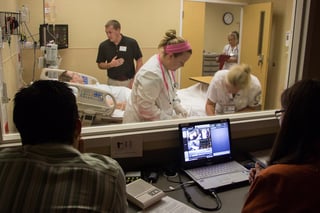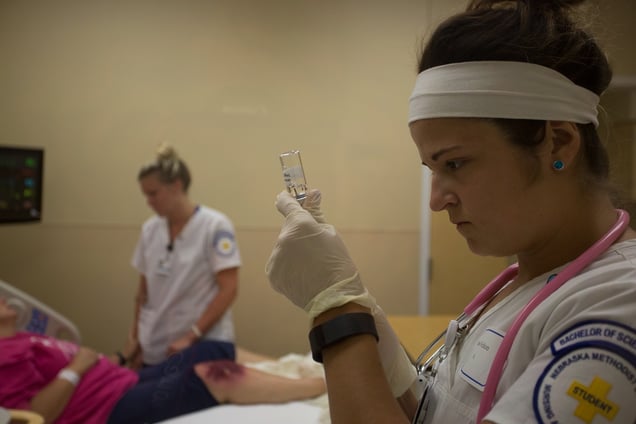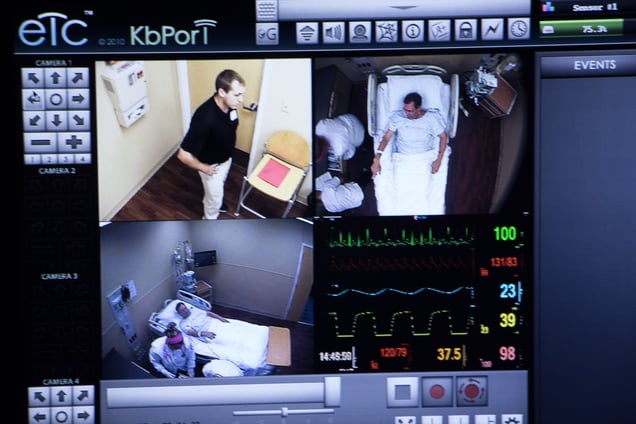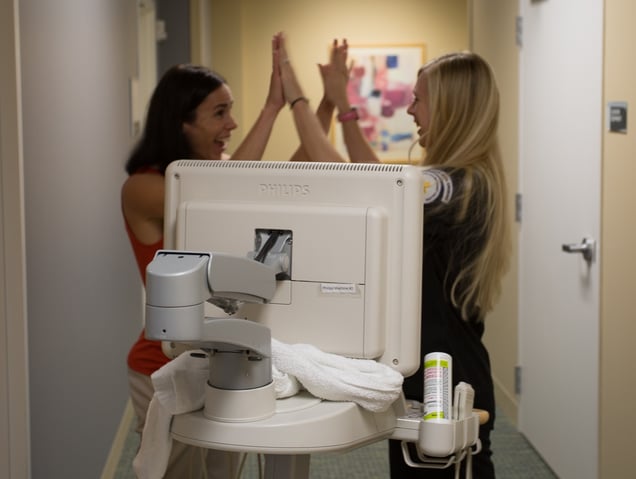 It wasn’t a typical day at Nebraska Methodist College. Students gathered in a large classroom to watch a video of an automobile accident. The victims sustained serious injuries requiring immediate medical attention.
It wasn’t a typical day at Nebraska Methodist College. Students gathered in a large classroom to watch a video of an automobile accident. The victims sustained serious injuries requiring immediate medical attention.
Those watching were then deployed to classrooms throughout the college, where they would be chosen at random to interact as a member of an interdisciplinary team to treat the patients.
This intense experience was at the heart of NMC’s Interdisciplinary Day on September 9. The purpose of the event was to emphasize to students the importance of collaboration as a healthcare team member in order to provide the best experience for the patient.
While nursing is certainly a vital part of what we do here, it’s not the only healthcare discipline taught at the college. The allied health students were able to see precisely how nurses-to-be reacted to different circumstances presented to them, and our nursing students were able to witness and appreciate the diverse array of skills that our health professions students brought to the team.

The Experience Unfolds
After their initial preparation, some of the students dispersed to the simulation lab areas of the college while others stayed to observe the proceedings through video-streaming. Four patients in total were to be cared for:
- A father with cracked ribs, a fractured pelvis and labored breathing
- A pregnant mother with a medical emergency
- A child with asthma and a fractured femur
- A grandmother with bipolar disorder and a potential blood clot
Following initial preparation, students from each department teamed up to assess and care for the patients. In two cases, the “patients” were high-tech simulators that, when controlled by a qualified instructor, mimicked the symptoms that would be present in a real-world situation.
In two other cases, the patients were portrayed by faculty actors. This gave students the opportunity to interact with an actual human being, learning what it means to respond to a father who is in intense pain or a woman whose bipolar episode triggers confusion and prevents typical conversations.
While some students ordered treatment, others observed, jotting down notes and watching with keen interest how their fellow classmates responded under pressure. The whole team had an opportunity after each scenario to discuss the witnessed collaboration and communication.

The Student Experience
Many students walked away with a newfound respect for not just their own discipline, but other areas of healthcare professions.
“I was chosen to be the recorder for my second scene,” said Taylor, a nursing student at the college, “which was the Grandma who was bipolar and very worried about her son and grandson. I was able to watch, listen and learn how my fellow classmates calmed the patient down and helped her through her struggles.”
“Each department has a different aspect of what to do with the patient. Seeing this helped educate the nurses on why they are there and why what they are doing is beneficial. Knowing the resources that I have in the hospital and clinical setting is huge. I felt we got to know exactly what those resources can do for us and how much they (the other students) enjoy what they are doing as well.”
Others, however, found out that things don’t always go according to plan in an emergency situation, as Radiologic Technology student Michael witnessed firsthand:
“To prepare…we took a day or two to practice trauma scenarios, particularly femur fractures because that was the scenario we were told we would be dealing with. Some people practiced with the portable x-ray machine. Nothing too extensive.
“The day went pretty smoothly, (but) our portable x-ray machine had died somehow so it took like three people to move it on the carpet. It made…the process of taking the x-rays a little more difficult but it wasn't too big of a deal.”
Technical snafus aside, what most students walked away with was a sense of camaraderie with their fellow future medical workers and a respect for every area of healthcare.
“I was a PTA (physical therapist assistant) doing therapy on an adult man,” said Molly. “I felt like this helped me with real life experiences because everything he did and the way he acted was that of many patients: confused and scared.
“I really enjoyed working with the nursing staff because I felt like we all had a common goal and respect for each other.”
At the end of the day, the faculty and staff hope that the Interdisciplinary Day was an extension of the virtues of Nebraska Methodist College and a demonstration that the values we hold dear will continue to thrive as our students enter the healthcare workforce. Toward that end, we’ll close with a great quote by Molly.
“I have had a great experience here at the college,” she said. “I am not a traditional student and I am the only mother in my class but we all are very close and I know I have made friends for life. I have been taught by some amazing people who have really changed my life and taught me so much. I feel very grateful to be part of such an amazing place.”
Did learning about the Interdiscipinary Scenario get you interested in learning more about our high-tech simulations? Then attend one of our Visit Days, where we'll preview the many features offered by Nebraska Methodist College. Register today!
